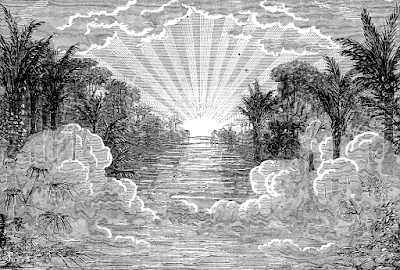The good laborer receives the bread of his labor with confidence; the lazy and careless one does not look his employer in the face. We must, therefore, be zealous in doing good; for all things are from Him. He warns us: Behold the Lord comes, and his reward is before his face, to pay each man according to his work. He therefore urges us who believe in Him with all our heart not to be lazy or careless in any good work. Let our glorying and our confidence be in Him; let us be subject to His will. Let us consider the whole multitude of angels, how they stand and minister to His will. For the Scripture says: Ten thousand times ten thousand stood by him, and thousands of thousands ministered to him, and they cried, “Holy, Holy, Holy, Lord of hosts the whole creation is full of His glory.” We, therefore, gathering together in concord in our conscience, also should cry out earnestly as with one voice to Him, that we may become participants in His great and glorious promises. For He says: Eye has not seen, nor ear heard, nor has it entered into the heart of man, what great things the Lord has prepared for those who wait for him.
Clement of Rome, 1 Clement 34
He says, I am the root and the offspring of David, but it would seem to have been more appropriate to say, “I am the branch which has sprung up from the root of David.” But, on the contrary, He has now called Himself the root of David, and not only the root but also the offspring, as was said earlier. A root is also the origin of everything, including David, so that He is, and is considered to be, God; but He is also the offspring of David, sprung from Him according to the flesh, insofar as He is, and is considered to be, a human being. This is who He is. “To say the same things more than once is not irksome to me, but is safe” for those who read, as the divine apostle says somewhere of his words. So therefore He is “Emmanuel” in His divinity and in His humanity, each of the two natures being complete according to their respective qualities, without confusion, without change, immutable, unimaginable. We believe that after the inexpressible union there is one person, one hypostasis, and one activity, “even if the difference of the natures, from which we say that the ineffable union has been effected, may not be overlooked,” as well as the peculiar quality of each nature, according to the words of our blessed father Cyril [of Alexandria]. …
He says, The Spirit, that is, the prophetic spirit, and the bride—the whole church in every place—say, “Come!” We are enjoined to seek the second coming of the Lord, but also to put it into prayer. For the one who says, “Your kingdom come,” to God is asking for the kingdom of Christ, which is also the kingdom of the Father and of the Spirit. He says, And let him who hears say, “Come”: He means, “let everyone who hears the present words, including you, John, utter a prayer for the kingdom of the coming of Christ.” In saying this He is urging everyone to follow the works and practice of righteousness. For no one who is not himself conversant with righteousness could pray for the coming of Christ, since he will then be required to give an account of what he has done in his life.
Oecumenius, Commentary on the Apocalypse 22.15-19




